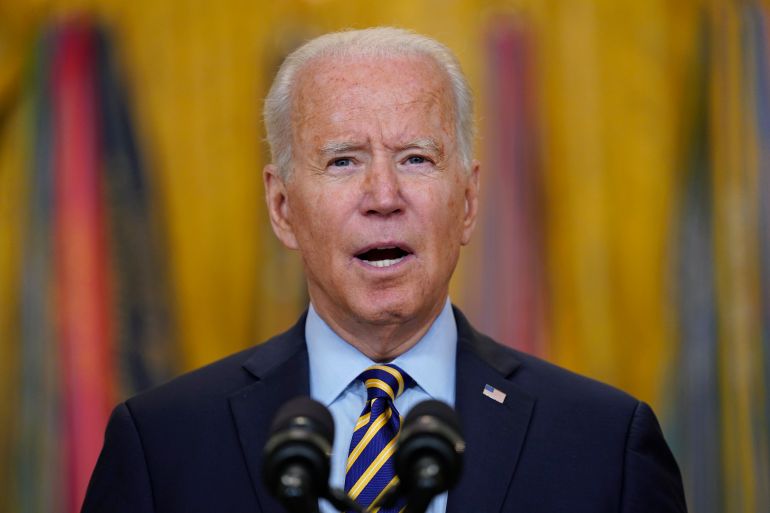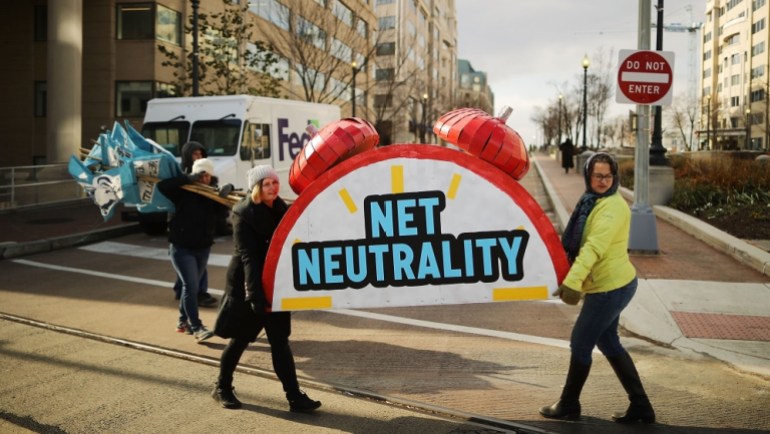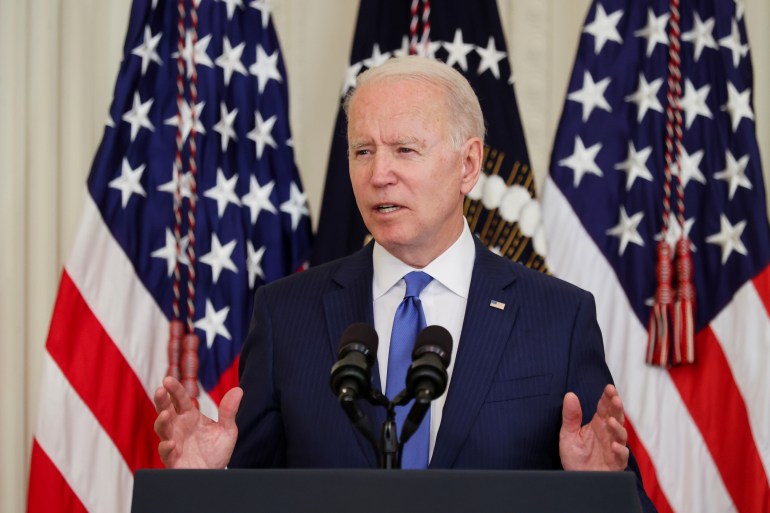Biden’s executive order seeks to rein in major US firms
The US president’s directive seeks to address the sharp increase in the consolidation of industries over the last two decades, which has raised worries that the biggest companies are choking off competition and innovation.

President Joe Biden will sign a sweeping executive order designed to promote competition across American industries and in the labor market, calling on regulators to take steps to lower drug prices, toughen merger enforcement in technology and banking and give workers more power to change jobs and negotiate higher wages.
While there’s a long way to go from a presidential directive to final regulations, the president’s directive seeks to address the sharp increase in consolidation of industries over the last two decades, which has raised worries that the biggest companies are choking off competition and innovation.
Keep reading
list of 4 itemsUS speeds Afghanistan withdrawal as Biden sets August deadline
No ‘Khashoggi ban’: Biden team criticized for hosting MBS brother
Biden administration ‘encouraged’ by ongoing OPEC talks
The White House blames declining competition across the economy for raising prices for consumers for necessities like prescription drugs, lowering wages for workers and acting as a drag on growth and innovation.
“Higher prices and lower wages caused by lack of competition are now estimated to cost the median American household $5,000 per year,” the administration said.
But the U.S. Chamber of Commerce issued a rebuke of Biden’s approach.
“Today’s executive order is built on the flawed belief that our economy is over-concentrated, stagnant and fails to generate private investment needed to spur innovation,” Neil Bradley, the business lobby’s executive vice president, said in a statement. “Such broadsided claims are out of touch with reality, as our economy has proven to be resilient and remains the envy of the world.”
The order includes 72 initiatives by more than a dozen federal agencies. Here are details on some of the initiatives outlined in the order:
Restoring Open Internet Rules

The Federal Communications Commission is asked to reinstate net neutrality rules that barred internet service providers from blocking or slowing certain content or speeding up delivery for a price. Those rules had been implemented under former President Barack Obama but rolled back under former President Donald Trump.
The order also calls on the FCC to prevent internet providers from negotiating exclusive deals with landlords that leave renters with just one internet option, and to limit high termination fees cable companies charge when consumers switch providers.
The Federal Trade Commission is asked to establish rules on data collection by tech companies and regulations barring “unfair methods of competition” by the biggest tech platforms in order to protect businesses that depend on the companies to reach customers.
Policing Bank Mergers
The order, which blames consolidation in banking for raising costs for consumers and restricting credit to small businesses, calls on the Justice Department and banking regulators to update guidelines on bank mergers to toughen scrutiny of deals.
The Consumer Financial Protection Bureau is asked to issue rules to make it easier for consumers to switch banks by allowing them to download their banking data and take it with them.
Improving Health Care
The order targets areas where it says the lack of competition increases prices and reduces access to quality care, starting with prescription drug prices.
Biden’s order will call on federal health officials to work with states to come up with plans to import medicines from Canada, where they are cheaper.
The president’s plan in some ways echoes policies that former President Donald Trump proposed a year ago.

Then, Canada balked at the proposal to let Americans import medicines, and the neighbor to the north later imposed measures limiting distribution of drugs to protect its supply from bulk sales across the border.
Biden has directed the Department of Health and Human Services to issue a comprehensive plan within 45 days to counter high drug prices.
That could bring back proposals by Trump and some Democrats to benchmark drugs to the cheaper prices paid in countries with national health systems.
It’s a move that drugmakers said would stifle innovation. Industry trade groups, the Pharmaceutical Research and Manufacturers of America and the Biotechnology Innovation Organization, didn’t immediately respond to requests for comment.
Biden will also urge the FTC to stop pharmaceutical manufacturers from paying their generic counterparts to delay entry into the market of lower-priced versions of medications. That idea is part of pending legislation in the Senate and aligns with campaign promises Biden made last year.
The Association for Accessible Medicine, the leading trade group for the generic drug industry, said it’s looking forward to working with the Biden administration to increase adoption of lower-cost generics and biosimilars “and remedy the growing number of government and payer policies that perversely reward the use of high-cost brands over generic or biosimilar competitors.”
Hospital consolidation has increased health-care costs and reduced service for some communities, especially rural areas, the order notes. The executive order directs the Justice Department and FTC to tighten their merger guidelines for hospital deals. It also directs HHS to support hospital price transparency rules and finish implementing legislation to address surprise hospital billing.
Measures to Benefit Farmers
The order calls for new rules to benefit farmers and ranchers. It directs the Agriculture Department to make it easier for cow, pig and poultry farms to sue large processors if they are underpaid or retaliated against.

It also asks the USDA to consider issuing new rules defining when meat can bear “Product of USA” labels to restrict companies from labeling food produced overseas as American-made when it was simply processed domestically.
The measure also orders the Agriculture Department to help farmers access markets and receive a fair return on their goods, including supporting alternative food distribution systems like farmers’ markets and developing standards and labels so that consumers can choose to buy products that treat farmers fairly.
It encourages the FTC to keep equipment manufacturers from limiting consumers’ ability to repair products at independent shops or on their own.
The move is intended to especially benefit farmers, who face expensive repair costs from tractor manufacturers that use proprietary tools and software to prevent third parties from working on equipment.
Limiting Noncompete Agreements
The labor market element of the order focuses on restricting the non-compete agreements that have become common in certain industries and limit worker mobility. The measure also asks for updated antitrust rules regarding companies that share wage and benefit information to avoid competing for workers.
It asks the FTC to eliminate occupational licensing requirements that can create barriers of entry for new job applicants in certain fields. Biden also reiterated his support for a pro-labor bill that passed the House and is stalled in the Senate, which would make it easier for workers to organize in unions.
Combating Airline, Shipping Fees
Biden is also taking aim at consolidation in the air industry, especially the extra fees for things like baggage, on-flight services and cancellations, which are “often raised in lockstep, demonstrating a lack of meaningful competitive pressure,” according to the White House.
The EO says the top 10 airlines collected $35.2 billion in assorted fees in 2018, compared to only $1.2 billion in 2007.
The order instructs the Transportation Department to make sure those fees are transparent and, when the service isn’t provided, refunded.
For railroads, currently dominated by just a handful of freight rail companies, the measure would require track owners to give right of way for passenger rail and to treat other freight companies equally. The measure also addresses shipping fees, which domestic manufacturers are currently forced to pay to foreign companies.
Freight railroad and shipping trade groups expressed opposition to Biden’s order, saying that there’s sufficient competition among their industries and the order would put them at a disadvantage.
“We urge everyone to make decisions based on the real facts about the situation before we create long-term negative results through ill-considered regulatory changes to handle a temporary situation,” John Butler, president and chief executive officer of the trade group World Shipping Council, said in a statement.
Roles for Agencies
The Biden order echoes an Obama administration order in 2016 that said government agencies beyond those responsible for antitrust enforcement had a role to play in protecting consumers, workers and business from being harmed by instances of market power in the economy.
Unlike the Biden order, however, Obama’s didn’t direct individual agencies to take specific actions and instead required them to come up with their own plans.
That order built off a report by the Council of Economic Advisers outlining evidence that industries across the U.S. economy suffer from rising consolidation and declining competition.
Since then, attention to the power of dominant companies has only grown as economists and policy makers raise concern that rising concentration is ailing large swaths of the economy and contributing to problems including income inequality, stagnant wages and low productivity growth.
While the drafting and implementation of new rules and regulations may take months and will be largely handled by individual departments and agencies, the White House has made clear it expects that the executive order could lead to significant changes that entail a major impact on several industries.

The measure advances the administration’s push to step up antitrust enforcement amid widespread criticism that enforcers at the Justice Department and the Federal Trade Commission haven’t gone far enough to police mergers and anticompetitive conduct.
Last month, Biden unexpectedly named Columbia Law School professor Lina Khan to lead the FTC, putting one of the most prominent advocates for a far more forceful antitrust agenda in charge of the agency.
Biden has yet to nominate a chief for the Justice Department’s antitrust division, leaving the unit without political leadership five months into the administration as it forges ahead with a monopoly case against Alphabet Inc.’s Google and a lawsuit to block Aon Plc’s proposed $30 billion acquisition of Willis Towers Watson Plc.
The White House effort adds to a widespread push for stronger antitrust enforcement in Washington, where bipartisan majorities on the House Judiciary Committee in June advanced six antitrust bills, primarily aimed at the biggest tech companies. The proposals represent an effort to revamp antitrust laws and give competition enforcers more authority.